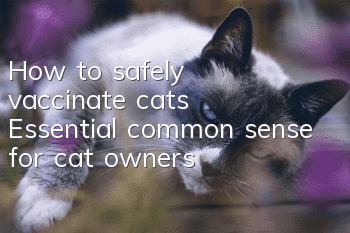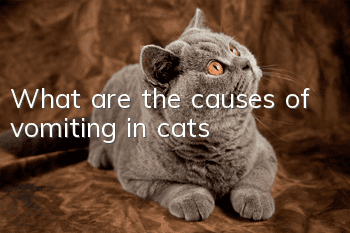How to safely vaccinate cats? Essential common sense for cat owners!

Cat vaccination
How to safely vaccinate cats? Essential common sense for cat owners! The essence of the vaccine is a virus that has been inactivated after treatment. It is theoretically invulnerable to the body. Harmful, but in the process of vaccinating cats, there will always be some accidents, such as side effects, and it is not uncommon for cats to be vaccinated to death. So in general, vaccination is not a trivial matter. , doctors and owners need to prepare cats in all aspects.
There is a recent news story about cats killed by vaccination. Ms. Zheng, a cat owner in Beijing, had her pet cat die after being vaccinated at a pet hospital. Ms. Zheng sued the pet hospital to the court and asked the pet hospital to Compensation for the cost of purchasing, raising, and cremating the cat is 39,380 yuan, requiring the pet hospital to purchase an urn worth 5,000 yuan for the cat, and compensation for mental losses of 20,000 yuan. Recently, Haidian Court concluded the case. After trial, the court held that during the process of injecting vaccines for cats, the pet hospital had work flaws in terms of veterinary qualifications, prescription records, and pre-injection risk notifications, although these work flaws did not constitute a causal relationship with the death of the cat. , but should also bear some responsibility for the death of the cat. In terms of the amount of compensation, the court believed that the evidence submitted by Ms. Zheng could not prove her actual expenses for purchasing, raising and cremating the cats, so the court determined Ms. Zheng’s loss to be 2,000 yuan. Regarding Ms. Zheng’s other claims, the court held that there was no legal basis and did not support them. Finally, the court ruled that the pet hospital should pay Ms. Zheng 2,000 yuan in compensation.
Vaccination is a very troublesome thing that really causes doctor-patient disputes. Adverse reactions after vaccination are caused by many reasons, such as the cat’s physical condition and the choice of vaccine. wait. Cat vaccines are divided into core vaccines and non-core vaccines. Core vaccines are vaccines for pathogens that are highly dangerous to cats, while non-core vaccines are vaccines for pathogens that are less dangerous to cats. To put it simply, core vaccines are vaccines that must be administered, while the selection of non-core vaccines is based on the distribution of pathogens in different regions and countries, as well as the virus conditions in the environment where cats live.
1. The core vaccines for cats: feline parvovirus (i.e. feline distemper/feline panleukopenia), feline herpesvirus type 1, feline calicivirus, rabies virus vaccine, of which the first three vaccines The combination vaccine is the common triple vaccine for cats.
2. Non-core vaccines for cats: feline leukemia virus, feline HIV, feline infectious peritonitis virus, feline chlamydia, and Bordetella bronchiseptica vaccine.
The so-called combined vaccine is a combination of vaccines for two or more diseases. Generally speaking, the more vaccines are injected, the less stable the immune effect will be. Each vaccine has its own characteristics and its own immunity duration. Similar to the wooden barrel principle, the duration of the combined vaccine is the shortest one among the several vaccines in the combination. In other words, if the three vaccines in a triple vaccine lastThe intervals are 1 year, 2 years and 3 years respectively, then the combined vaccine should be injected with a booster shot once a year. Otherwise, once the immunity duration of one of the vaccines (usually a non-core vaccine) expires, it will lose its protective effect on the animal, and the animal will be exposed to danger.
Notes:
1. Kittens can only be vaccinated if they are over 60 days old (about 10 weeks). In kittens less than 10 weeks old, the antibodies obtained from breast milk have not disappeared. If the vaccine is injected at this time, the vaccine and antibodies will interact, which will make the injected vaccine lose its preventive effect.
2. After the first injection of vaccine for kittens or cats receiving vaccination for the first time, they should be vaccinated again (called booster injection) about 4 weeks apart.
3. Generally Choose subcutaneous injection of vaccine on the shoulder and back
4. The vaccine must be refrigerated at 2 to 8 degrees Celsius
5. The skin must be thoroughly disinfected before injecting the vaccine.
6. After the vaccine is injected, as the immune system begins to react, symptoms such as fever, poor spirits, loss of appetite, drowsiness, etc. may occur. These are normal reactions and usually resolve on their own in 1-3 days. recover. After the injection, the cat should be provided with adequate nutrition and vitamin supplements.
7. After vaccination, there is a certain protection rate, but the protection rate is not 100%. This shows that vaccinated cats may also contract infectious diseases if they come into contact with sick cats when their resistance is reduced.
8. It takes about 7 days after the vaccine is injected to produce a certain amount of antibodies, so within a week of the vaccine, you should avoid taking a bath or going out.
9. If you want to receive additional rabies vaccine, cats over three months old can be vaccinated. After injection, the immunity is valid for one year and should be immunized once a year.
10. Cat triple vaccine and rabies vaccine cannot be mixed in the same syringe for injection, including the use of the same syringe for injection
11. Vaccines that need to be injected with diluent and dry powder must be mixed If mixed at the time of use, the mixed vaccine will become ineffective.
12. The Taiwanese-translated instructions for Fudao’s cat pentavalent vaccine states: It should be injected into cats over 8 months old. Pregnant female cats cannot be injected.
- Is a cat with diarrhea waiting to die?
- Is it better to have a male cat or a female cat? You will understand after reading this article!
- What should I do if my cat is injured? How to treat the wound after the cat is injured!
- Signs of a stillborn kitten in a female cat
- What should you do if your cat is constipated as he gets older? Let’s talk about the causes of constipation in cats!
- Why do cats imitate babies crying at night?
- What should I do if my cat coughs up phlegm and can’t cough it up?
- Why do Siamese cats like to hide under the sofa? A must-read for pet owners!
- How to tell the gender of a cat
- Are cats color blind (how many colors can cats distinguish)



